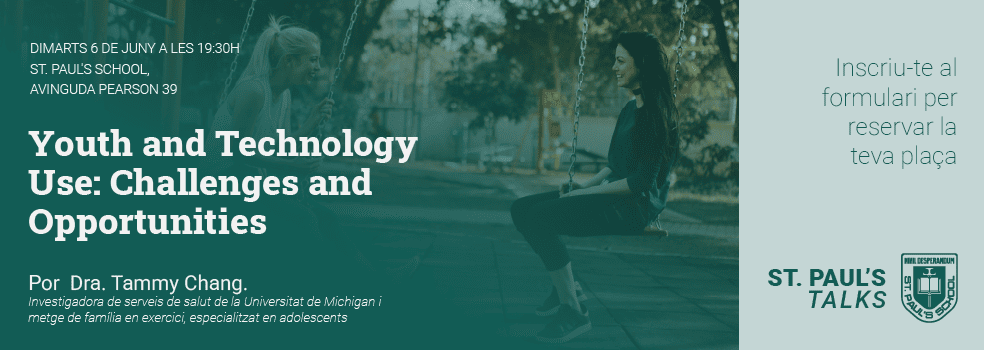16 May Youth and Technology Use: Challenges and Opportunities
“We invite you to our next session of St. Paul’s Talks on June 6th, with Tammy Chang, a health services researcher and family physician.”
Adolescence is a stage of life marked by many changes and challenges, and one of the most important aspects that are affected during this phase is brain development. During adolescence, the brain undergoes significant transformations that can influence emotional well-being and social interactions.
The adolescent brain is a fascinating landscape of growth and changes. Scientific research has revealed that during this stage, the brain undergoes a process known as “synaptic pruning.” This process involves eliminating unnecessary neural connections while strengthening and refining essential connections. The prefrontal cortex, responsible for decision-making, impulse control, and emotional regulation, is still developing during adolescence. This partly explains the heightened emotional reactivity and impulsive behaviour often observed in young people aged 12 to 18.
Feelings of loneliness are another characteristic of this stage that make them more vulnerable to a multitude of factors such as hormonal changes, social pressures, academic stress, or the development of personal identity. The need for peer acceptance, along with the fear of rejection, can intensify feelings of loneliness, leading to potential issues such as depression, anxiety, or isolation.
Technology also plays a significant role in the lives of adolescents. Despite the appropriate teaching and understanding of numerous benefits, such as easy access to information and increased connectivity, which are extensively addressed at the center, technology also presents challenges. Excessive use of social media has been linked to an increase in feelings of loneliness. Constant exposure to carefully curated glimpses of others‘ lives can foster unrealistic social comparisons, decreased self-esteem, increased feelings of isolation, and even personal attacks shielded by the anonymity of online platforms.
In order to address the growing concerns of families, we have invited Dr. Tammy Chang to delve deeper into the effects of social media on rest and sleep, anxiety, depression, and self-esteem issues. Dr. Chang is a University of Michigan health services researcher and practicing family physician that specializes in adolescents, and director of MyVoice , a nationwide poll of youth in the United States.
Please register here.



